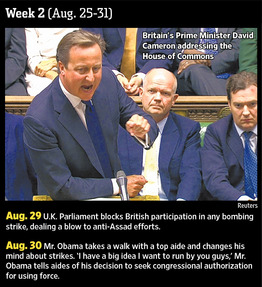Inside White House, a Head-Spinning Reversal on Chemical Weapons
< < Go Back
How the U.S. Stumbled Into an International Crisis and Then Stumbled Out of It.
When President Barack Obama decided he wanted congressional approval to strike Syria, he received swift—and negative—responses from his staff. National Security Adviser Susan Rice warned he risked undermining his powers as commander in chief. Senior adviser Dan Pfeiffer pegged the chances of Congress balking at 40%. His defense secretary also raised concerns.
Mr. Obama took the gamble anyway and set aside the impending strikes to try to build domestic and international support for such action.
He found little of either. Congress’s top leaders weren’t informed of the switch until just an hour or so before Mr. Obama’s Rose Garden announcement and weren’t asked whether lawmakers would support it. When the president’s chief of staff, Denis McDonough, announced the decision on a conference call with congressional committee leaders, some were so taken aback they seemed at first to misunderstand it.
Outside the U.S., Arab leaders privately urged the U.S. to bomb, but few backed Mr. Obama publicly. The United Kingdom pulled the plug on a joint operation two days after indicating to the White House it had the votes to proceed. Compounding the confusion, the same day a potential breakthrough emerged via a diplomatic opening provided by Russia, the administration sent a memo to lawmakers highlighting why Russia shouldn’t be trusted on Syria.
This account of an extraordinary 24 days in international diplomacy, capped by a deal this past weekend to dismantle Syria’s chemical-weapons stockpile, is based on more than two dozen interviews with senior White House, State Department, Pentagon and congressional officials and many of their counterparts in Europe and the Middle East. The events shed light on what could prove a pivotal moment for America’s role in the world.
Mr. Obama infuriated allies who lined up against Mr. Assad and his regional backers Iran and Hezbollah. French officials, who were more aggressive than the U.S. in urging a strike, feel they have been left out on a limb. And Russia has been reestablished as a significant player on the world stage, potentially at the expense of the U.S.
House Intelligence Committee Chairman Mike Rogers (R., Mich.) joined a chorus of Republican lawmakers critiquing the deal, calling it a “Russian plan for Russian interests” that leaves Mr. Assad in power. “Putin is playing chess, and we’re playing tick-tack-toe,” he told CNN.
[Here is how it all developed:]
More From The Wall Street Journal (subscription required):







